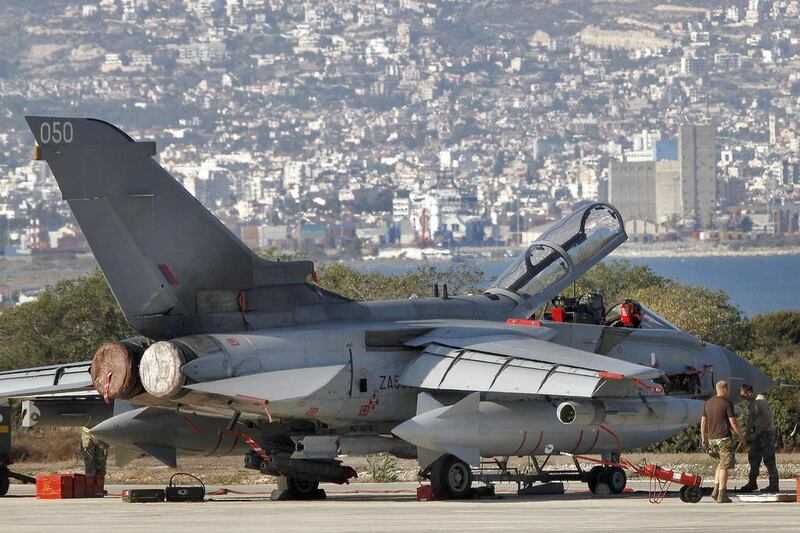AKROTIRI, CYPRUS // The huddle of Greek Cypriot men at a coffee shop in Akrotiri village fully supported Britain’s bombing of ISIL, spearheaded by Tornado GR4 fighter jets taking off from a giant RAF station just down the road.
“I think they should wipe out ISIL,” said a chef in his 50s, slapping down a backgammon counter. “ISIL is a menace to human existence. They’re totally against our way of life, our civilisation.”
The inhabitants of this small, sleepy village live on the doorstep of Britain’s launching pad for its third war in Iraq in nearly a quarter of a century. They were already accustomed to the roar of Tornado Rolls-Royce engines. Six Tornado GR4s had been flying intelligence, surveillance, target-acquisition, and reconnaissance missions over northern Iraq from RAF Akrotiri for the six weeks before a British parliamentary vote on September 26 authorised them to bomb ISIL fighters in Iraq if called to do so by Baghdad. Iraq formally requested the British airstrikes against ISIL just before the parliament voted.
Until last week neither of Britain’s two military bases on its former colony had been used in direct offensive action on another country since the 1956 Suez Crisis when British jets bombed Egypt from Cyprus.
But RAF Akrotiri on Cyprus’s southern coast has long been a hub for military operations. It was a key staging and supply post for British forces in the 1991 and 2003 wars against Iraq, a role it retains for operations in Afghanistan. In 2011, RAF Akrotiri was used to coordinate movements of UK jets enforcing the no-fly zone over Libya and hosted British surveillance and air-to-air refuelling aircraft.
But the airbase was not used for direct military action in any of those campaigns.
After Cyprus won independence in 1960, it opposed the 250 square kilometres of land Britain retained as “sovereign” territory for two miliary bases being used in offensive action against neighbouring Arab states.
But Cyprus sees ISIL’s staggering brutality as a threat.
President Nicos Anastasiades, a conservative elected last year, has swiftly reoriented Cyprus’s foreign policy, bringing it closer to the West after five years of rule by a communist-led government that leaned more towards Russia.
RAF Akrotiri’s station commander, Chaz Kennett, thanked the Greek Cypriot government for its help on Thursday.
“The successful defeat of ISIL is only possible with the assistance and cooperation of our friends and allies including the Republic of Cyprus who are a key security and strategic partner in the region,” he said. “We have regularly discussed the threat posed by ISIL with the Cypriot government, who recognise and support the need for action.”
Cyprus also agreed this week that France can use a Cypriot military airbase near Paphos for humanitarian and transport operations, although not for combat missions in Iraq.
Mr Anastasiades is keen to demonstrate that Cyprus is a reliable ally and geostrategic asset to its partners in the European Union and the United States. Its value is as a safe haven on the EU’s easternmost frontier, perched on the edge of the bloc’s most volatile region where the West has key security and energy interests.
The Cypriot foreign minister, Ioanis Kasoulides, said on Wednesday that his country had a “duty to participate in this battle [against ISIL], as the rest of the international community does, because our civilisation, our freedom are in danger as a result of this sickening mentality of the jihadists”.
The British military action from Cyprus will not upset the island’s long-term policy of maintaining cordial relations with Arab and other Muslim states, Cypriot officials say.
Some Gulf Arab states, where recession-hit Cyprus is trying to drum up investment, are part of the coalition against ISIL and involved in the US-led bombing of the terrorist organisation in Iraq and Syria.
Cypriot officials also insist Britain’s use of RAF Akrotiri does not make Cyprus more vulnerable to militant reprisals. ISIS poses a threat regardless, Mr Kasoulides said: “We are becoming a target anyway as Christians.”
He recalled examples of Christians in Mosul and other Iraqi cities who were forced by ISIL to convert to Islam, flee or were killed.
“We are all in the same battle.”
Cyprus has not seen a terrorist attack since May 1988. A car bomb intended for the Israeli embassy in Nicosia blew up instead on a
nearby bridge, killing two Cypriots and the vehicle’s terrorist driver. Abu Nidal’s militant Palestinian splinter group claimed responsibility.
In 1986, three people were wounded when the RAF Akrotiri was attacked by Libyan militants following US attacks on Libya that year.
In Akrotiri village, the mood was relatively relaxed, although some expressed concern about the British military action — without opposing it.
“I’m not happy Akrotiri is being used. I’m worried that [ISIL} could cause trouble for Cyprus,” said a kiosk owner in his 20s. “They now know we’re at the centre of the British action. But Britain has to hit them. I just hope they’ll finish off [ISIL] as soon as possible and get it over with.”
foreign.desk@thenational.ae





